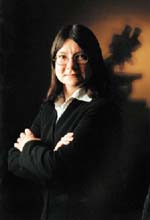The eXtremophiles
Posted by news
Move over, Scully and Mulder. UMR scientists are hot on the trail of a new life form: the extremophiles.
 |
| Melanie Mormile, a UMR assistant professor of biological sciences, studies extremophiles — bacteria that exist in extreme environments. "Finding new microorganisms, trying to figure out what they’re doing and how they interact with the nutrients present … is exciting," she says. |
Melanie Mormile, a UMR assistant professor of biological sciences, recently received a "Microbial Observatory" grant from the National Science Foundation to study extremophiles — bacteria that exist in extreme environments.
Working with biologists at Central Washington University and the Center for Multiphase Environmental Research at Washington State University, Mormile is studying the microbial life in Soap Lake, Wash. It seems Soap Lake is a hotbed for certain types of extremophiles — critters that thrive in the salty environment.
"Soap Lake is a very unique environment in that it is a saline alkaline lake," Mormile says. "You have high pH and high salinity and there is an awful lot of anaerobic activity there."
On a trip to Washington last summer, the researchers used a hammer to break open rocks above the surface of the water near the shore and gas escaped, producing bubbles. "The rocks have a greenish tinge, probably indicating the presence of algae or cyanobacteria," Mormile explains. "The bubbles could be oxygen that these organisms are producing." In the deeper areas of the lake, the researchers have found evidence of hydrogen sulfide production — as evidenced by a rotten-egg odor.
"Just studying this unique environment is exciting — finding new microorganisms, trying to figure out what they’re doing and how they interact with the nutrients present," says Mormile. "Because of the activities they’re involved in, these bacteria might have useful enzymes present." A common example of applying such useful enzymes successfully is laundry detergent. An enzyme used to break down protein stains in laundry detergent originated in an alkali-based bacteria.
In the future, Mormile wants to study the biological degradation of pollutants that may occur in Soap Lake. By studying the presence of hydrocarbons from a road near the lake, she hopes to determine if the Soap Lake bacteria can break down those pollutants and if so, how. The study could have massive ecological implications for cleaning the environment.